人教新目标英语九年级全册教案
人教版英语九年级全一册教案:Unit4 SectionA(3a-3c)

人教版英语九年级全一册教案:Unit4 SectionA(3a-3c)Unit4 SectionA(3a-3c)教案【教材版本与册数】新目标人教版九年级上册【单元名称】Unit4 I used to be afraid of the dark.【课时】Section A 3a-3c(第2课时)【课型】Reading(阅读课)第 2 页第 3 页教材分析第 4 页教学目标教学重难点教学重点:1.正确使用Section A 3a-3c所有重点单词,短语和句型;正确使用used to结构,包括肯定、否定、疑问及其回答。
2.学习用描述人的个性的词汇描述人的变化。
教学难点:学用描述人的个性的词汇描述人的变化。
建议教法以任务型教学作为课堂教学理念、利用引导法和三步阅读教学法完成相应阅读任务。
Pre-reading: lead in-PresentationWhile-reading: Skimming- Scanning– Intensive reading-Listening and readingPost-reading: Retelling-Discussion-Inference-Different activities第 5 页教学流程(详见相应教学设计)教学评价1.本课时的目标设计清晰可操作,活动的设计紧扣目标要求并与目标达成一致。
2.读中的活动设计遵循语言规律,符合阅读课目标,由浅入深,环环相扣,能兼顾边缘生。
3.读后的活动设计体现运用教材有创造性,补充内容有针对性,拓展知识有可行性,课后作业能体现知识的迁移性。
有利于对学生思维品格的训练与培养。
【本课时教学设计】步骤过程措施(教师活动与学生活动)目的持续性评价DELC4 1预备与激活先期知识Step 1Greeting andLeading in( 3mins)Greet the class as usual and ask Ss to reviewusing “used to” and “ now”. E.g.T:What did you use to be like?S: I used to be shy.T:Are you still now?S: No, I’m not.I am popuar..2.T asks Ss some students.(1) How have you changed since you was a child?(2) What does it help you with?利用IQEE策略,利用复习所学描述人物外貌和性格的方法及词汇,通过老师询问学生从小到大的转变的问题与本堂课的话题Candy的人生经历变化建立起记忆连接。
人教新目标版九年级英语全册全一册教案
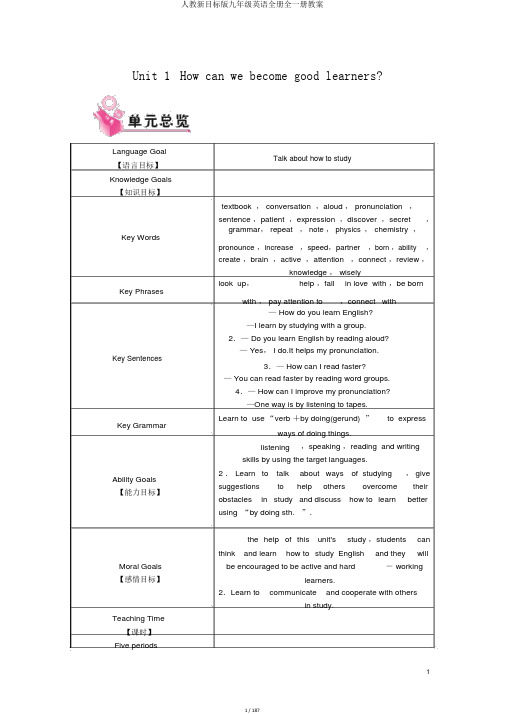
Unit 1 How can we become good learners?Language GoalTalk about how to study【语言目标】Knowledge Goals【知识目标】textbook , conversation ,aloud , pronunciation ,sentence ,patient ,expression ,discover ,secret ,grammar, repeat , note , physics , chemistry ,Key Words,speed,partner ,born ,ability ,pronounce ,increasecreate ,brain ,active ,attention ,connect ,review ,knowledge , wiselylook up,help ,fall in love with ,be born Key Phrases,connect withwith , pay attention to— How do you learn English?—I learn by studying with a group.2.— Do you learn English by reading aloud?— Yes, I do.It helps my pronunciation.Key Sentences3.— How can I read faster?— You can read faster by reading word groups.4.— How can I improve my pronunciation?—One way is by listening to tapes.Learn to use “verb +by doing(gerund) ”to express Key Grammarways of doing things.listening ,speaking ,reading and writingskills by using the target languages.Ability Goals 2 . Learn to talk about ways of studying , give suggestions to help others overcome their【能力目标】obstacles in study and discuss how to learn betterusing “by doing sth. ”.the help of this unit's study ,students canthink and learn how to study English and they will Moral Goals be encouraged to be active and hard - working 【感情目标】learners.2.Learn to communicate and cooperate with othersin study.Teaching Time【课时】Five periodsPeriod 1 Section A(1a - 2d)Period 2 Section A(3a - 4c)Period 3 Section B(1a - 1e)Period 4 Section B(2a - 2e)Period 5 Section B(3a - 3b) & Self Check本单元环绕学习的话题,叙述了学习的阻碍及对应的解决方法,对学生的学习有重要意义。
九年级英语全册 Unit 1(第1课时)教案 (新版)人教新目标版
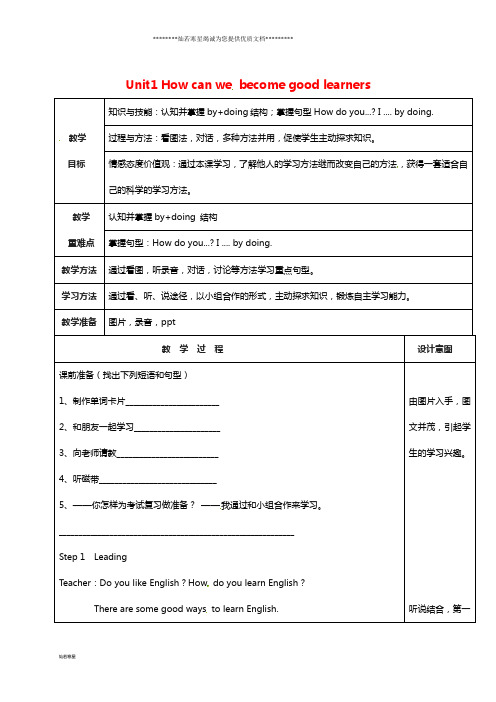
Unit1 How can we become good learners教学目标知识与技能:认知并掌握by+doing结构;掌握句型How do you...? I .... by doing.过程与方法:看图法,对话,多种方法并用,促使学生主动探求知识。
情感态度价值观:通过本课学习,了解他人的学习方法继而改变自己的方法,获得一套适合自己的科学的学习方法。
教学重难点认知并掌握by+doing 结构掌握句型:How do you...? I .... by doing.教学方法通过看图,听录音,对话,讨论等方法学习重点句型。
学习方法通过看、听、说途径,以小组合作的形式,主动探求知识,锻炼自主学习能力。
教学准备图片,录音,ppt教学过程设计意图课前准备(找出下列短语和句型)1、制作单词卡片________________________2、和朋友一起学习______________________3、向老师请教__________________________4、听磁带______________________________5、——你怎样为考试复习做准备?——我通过和小组合作来学习。
____________________________________________________________Step 1 LeadingTeacher:Do you like English?How do you learn English?There are some good ways to learn English. 由图片入手,图文并茂,引起学生的学习兴趣。
听说结合,第一Step 2 New lesson1.学生领读1a中的短语,教师纠正错误读音,学生识记短语后再添加其他的学习英语的方法并且熟悉by doing s th.的用法。
2.认真听录音,看看这些学生的学习方法,紧挨着名字写下图中的字母。
人教新目标九年级全册英语教案Unit 7 Teenagers should be allowed to choose their own clothes
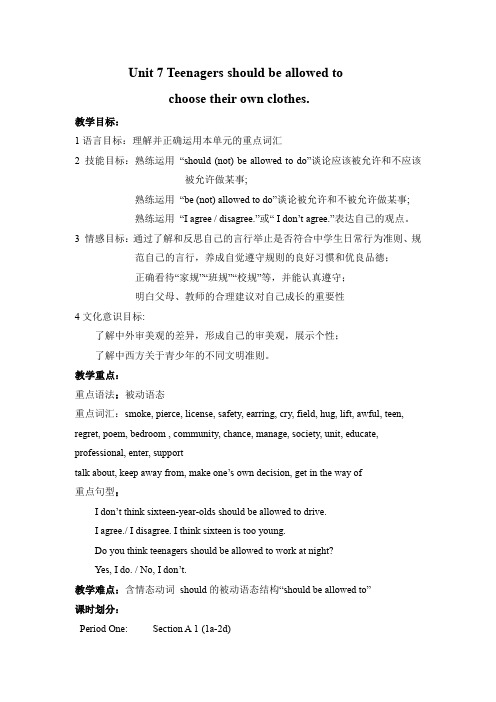
Unit 7 Teenagers should be allowed tochoose their own clothes.教学目标:1语言目标:理解并正确运用本单元的重点词汇2 技能目标:熟练运用“should (not) be allowed to do”谈论应该被允许和不应该被允许做某事;熟练运用“be (not) allowed to do”谈论被允许和不被允许做某事;熟练运用“I agree / disagree.”或“ I don’t agree.”表达自己的观点。
3 情感目标:通过了解和反思自己的言行举止是否符合中学生日常行为准则、规范自己的言行,养成自觉遵守规则的良好习惯和优良品德;正确看待“家规”“班规”“校规”等,并能认真遵守;明白父母、教师的合理建议对自己成长的重要性4文化意识目标:了解中外审美观的差异,形成自己的审美观,展示个性;了解中西方关于青少年的不同文明准则。
教学重点:重点语法:被动语态重点词汇:smoke, pierce, license, safety, earring, cry, field, hug, lift, awful, teen, regret, poem, bedroom , community, chance, manage, society, unit, educate, professional, enter, supporttalk about, keep away from, make one’s o wn decision, get in the way of重点句型:I don’t think sixteen-year-olds should be allowed to drive.I agree./ I disagree. I think sixteen is too young.Do you think teenagers should be allowed to work at night?Yes, I do. / No, I don’t.教学难点:含情态动词should的被动语态结构“should be allowed to”课时划分:Period One: Section A 1 (1a-2d)Period Two: Section A 2 (3a-3c)Period Three: Section A 3 (Grammar Focus-4c)Period Four: Section B 1 (1a-2e)Period Five: Section B 2 (3a-Self Check)Section A 1 (1a-2d)I. PresentationAsk students: Do your parents allow you to watch TV? Yes, they do.Present the sentence: You are allowed to watch TV.Teach “allow sb to do sth ““be (not) allowed to do sth”“should (not)be allowed to do sth”Present more sentence.Do your parents allow you to exercise?Yes, they do.You are allowed to exercise.Do your parents allow you to smoke?No, they don’t.You are not allowed to smoke.Do your parents allow you to drive?No, they don’t.You are not allowed to drive.Do your parents allow you to choose your own clothes?No, they don’t.You should be allowed to choose your own clothes.Do your parents allow you to get your ear pierced?No, they don’t.You should not be allowed to get your ear pierced.II. Warming upObey the school rules!As a teenager, you have a lot of rules at school. Can you write down some of them?Students should be allowed to speak English loudly.Students shouldn’t be allowed to sleep in class.Students shouldn’t be allowed to make noises.Students shouldn’t be allowed to throw the rubbish in the classroom. Students s houldn’t be allowed to get to class late.Explain:allow sb to do sth允许某人做某事be allowed to do sth被允许做某事should be allowed to do sth应该被允许做某事1a. Read the statements below. Circle A for agree or D for disagree.1. Teenagers should not be allowed to smoke. A D2. Sixteen-year-olds should be allowed to drive. A D3. Students should not be allowed to have part-time jobs. A D4. Sixteen-year-olds should be allowed to get their ears pierced. A D5. Teenagers should be allowed to choose their own clothes. A D III. Listening1b Listen and circle T for true or F for false.1. Anna can go to the shopping center by bus. T F2. Anna wants to get her ears pierced. T F3. Anna wants to choose her own clothes. T F IV. Practice1c Look at the statements in la and make conversations.A: I don't think sixteen-year-olds should be allowed to drive.B: I agree. They aren't serious enough.V. Key phrases1. be allowed to do 被允许去做2. the shopping center 购物中心3. driver’s license 驾驶执照4. sixteen-year-olds 16岁的孩子5. be worried about your safety 担心你们的安全6. part-time jobs 兼职工作7. get their ears pierced 穿他们的耳朵8. their own clothes 他们自己的衣服9. serious enough 足够严肃VI. Listening2a What do es Molly think of Kathy’s statements? Listen and circle A for Agree,D for Disagree or DK for Doesn’t Know.2b Listen again. What are Kathy’s and Molly’s reason s? Number their reasons in the correct order._____ It looks cool._____ Young people need to sleep._____ He needs to spend time with friends._____ He needs time to do homework._____ It doesn't look clean.VII. Practice1. 2c Make a list of things teenagers should and should not be allowed to do. Discussyour list with your partner.A: Do you think teenagers should...?B: Yes, I .../No, I...2. 2d Read the conversation and answer the questions.1) Where do they go for school trip?2) Does Mr. Smith allow students to take photos?3) How to take photos?3. Role-play the conversation.VIII. Summary1. Language pointsallow的用法1) Teenagers should be allowed to choose their own clothes.2) Teenagers should not be allowed to smoke.3) It is not allowed in the museum.4) Do you think we may be allowed to take photos if we don't use a flash?以上四句都含有重要的句型be allowed to do sth.,其中第三句是此句型的一般现在时,一二四句是情态动词与此句型的混合使用。
(共14套)最新人教新目标版 九年级英语(全册)教学案汇总(含全册内容)(打包下载)
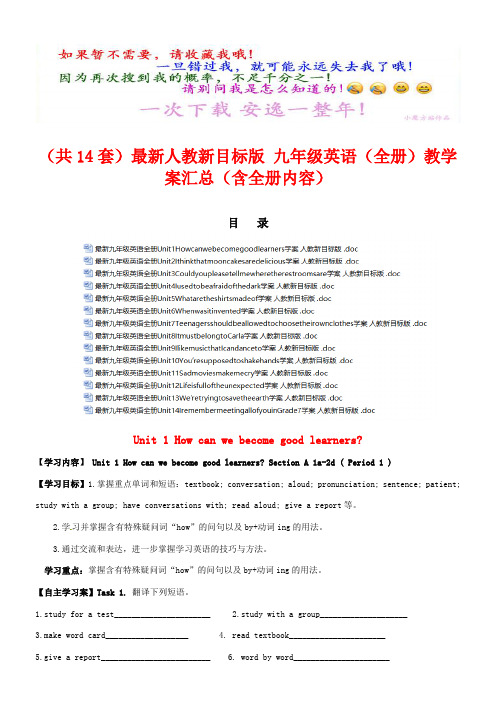
(共14套)最新人教新目标版九年级英语(全册)教学案汇总(含全册内容)目录Unit 1 How can we become good learners?【学习内容】Unit 1 How can we become good learners? Section A 1a-2d ( Period 1 )【学习目标】1.掌握重点单词和短语:textbook; conversation; aloud; pronunciation; sentence; patient; study with a group; have conversations with; read aloud; give a report等。
2.学习并掌握含有特殊疑问词“how”的问句以及by+动词ing的用法。
3.通过交流和表达,进一步掌握学习英语的技巧与方法。
学习重点:掌握含有特殊疑问词“how”的问句以及by+动词ing的用法。
【自主学习案】Task 1. 翻译下列短语。
1.study for a test______________________2.study with a group____________________3.make word card___________________4. read textbook______________________5.give a report_________________________6. word by word______________________7.大声朗读_________________________ 8.对话____________________________9.练习发音__________________________Task 2. I study for a test by____________________________________________I learn English by________________________________________________【合作学习案】e g. A: How do you study for s test? / learn English?B:I study for a test / learn English by...①—How do you study for a test? —I study by working with a group.②We usually go to school by bike.③English is spoken by many people.by的意思是“通过……的方式”时,后接;当表示“乘坐”时, 后跟;它还可以表示 , 用于被动语态,引导出动作的发出者。
人教版英语九年级全一册教案:Unit1SectionA(4a-4c)
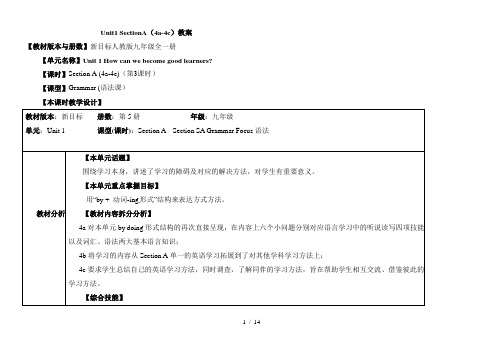
Unit1 SectionA(4a-4c)教案【教材版本与册数】新目标人教版九年级全一册【单元名称】Unit 1 How can we become good learners?【课时】Section A (4a-4c)(第3课时)【课型】Grammar (语法课)【本课时教学设计】教材版本:新目标册数:第5册年级:九年级单元:Unit 1 课型(课时):Section A Section SA Grammar Focus语法教材分析【本单元话题】围绕学习本身,讲述了学习的障碍及对应的解决方法,对学生有重要意义。
【本单元重点掌握目标】用“by + 动词-ing形式”结构来表达方式方法。
【教材内容拆分分析】4a对本单元by doing形式结构的再次直接呈现,在内容上六个小问题分别对应语言学习中的听说读写四项技能以及词汇、语法两大基本语言知识;4b将学习的内容从Section A单一的英语学习拓展到了对其他学科学习方法上;4c要求学生总结自己的英语学习方法,同时调查,了解同伴的学习方法,旨在帮助学生相互交流、借鉴彼此的学习方法。
【综合技能】1 / 142 / 14附:教学活动设计3 / 14/physics/chemistry?Do you learn history and geographyby________?学习兴趣DE LC5 2 获Step2Pre-Task(5 mins)Step 3While-TFind the new words and phrases重复,重做________物理__________化学___________记忆,记住________练习做某事_____________做笔记______句子模式_____________Answers:重复,重做----repeat物理___physics化学---chemistry记忆,记住---memorize练习做某事---practice doing sth做笔记---- take notes句子模式----sentence patterns为本节课语法任务的完成扫除障碍。
人教版新目标九年级英语全套教案
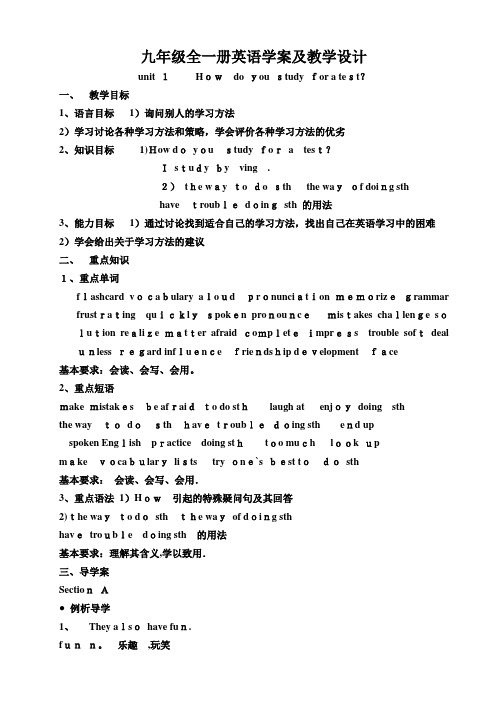
九年级全一册英语学案及教学设计unit 1Howdo you study for a test?一、教学目标1、语言目标1)询问别人的学习方法2)学习讨论各种学习方法和策略,学会评价各种学习方法的优劣2、知识目标1)How doyoustudy fora test?Istudy by ving.2)the way to do sth the wayof doing sthhavetroubledoingsth 的用法3、能力目标1)通过讨论找到适合自己的学习方法,找出自己在英语学习中的困难2)学会给出关于学习方法的建议二、重点知识1、重点单词flashcard vocabulary aloudpronunciation memorizegrammar frustrating quicklyspoken pronouncemistakes challenge solution realize matter afraid completeimpress trouble softdeal unless regard influencefriendship developmentface基本要求:会读、会写、会用。
2、重点短语make mistakes be afraidto do sthlaugh at enjoydoing sththe waytodosth havetroubledoing sth end up spoken English practice doing sthtoo much look upmakevocabularylists try one`s best todosth基本要求:会读、会写、会用.3、重点语法1)How引起的特殊疑问句及其回答2)the wayto dosth the wayof doing sthhavetrouble doing sth 的用法基本要求:理解其含义,学以致用.三、导学案SectionA● 例析导学1、They alsohave fun.funn。
初中英语人教新目标(九年级全册)unit4sectionB优秀教学设计
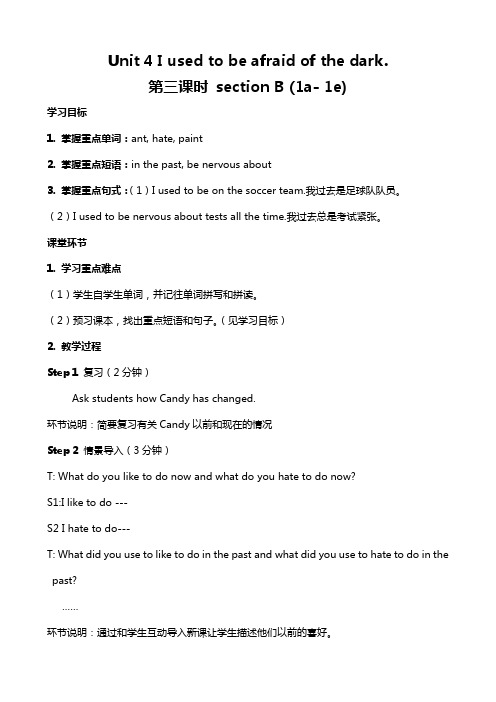
Unit 4 I used to be afraid of the dark.第三课时section B (1a- 1e)学习目标1. 掌握重点单词:ant, hate, paint2. 掌握重点短语:in the past, be nervous about3. 掌握重点句式:(1)I used to be on the soccer team.我过去是足球队队员。
(2)I used to be nervous about tests all the time.我过去总是考试紧张。
课堂环节1. 学习重点难点(1)学生自学生单词,并记往单词拼写和拼读。
(2)预习课本,找出重点短语和句子。
(见学习目标)2. 教学过程Step 1复习(2分钟)Ask students how Candy has changed.环节说明:简要复习有关Candy以前和现在的情况Step 2情景导入(3分钟)T: What do you like to do now and what do you hate to do now?S1:I like to do ---S2 I hate to do---T: What did you use to like to do in the past and what did you use to hate to do in the past?……环节说明:通过和学生互动导入新课让学生描述他们以前的喜好。
Step 3 完成教材1a---1e的任务。
1. 1a学生在代表其小时候喜欢做的事情的图片前做记号,并相互将来。
(2分钟)案例:I used to like P.E. class in the past.2. 1b.1e 学生在1a 方框中再多写几项其小时候喜欢做的事情,然后看同伴所喜欢的是不是自己所喜欢的,模仿1e的对话进行比较,练习会话(5分钟)3. 1c. 学生听听力材料,找出听到的句子(5分钟)4.1d. 学生再听听力材料,根据所听内容填空(5分钟)课堂资料包Step 1重难解析1. I used to be on the soccer team.on the soccer team.加入了足球队更多例子I am on the school basketball team.我加入了学校篮球队。
人教版新目标九年级英语全册教案
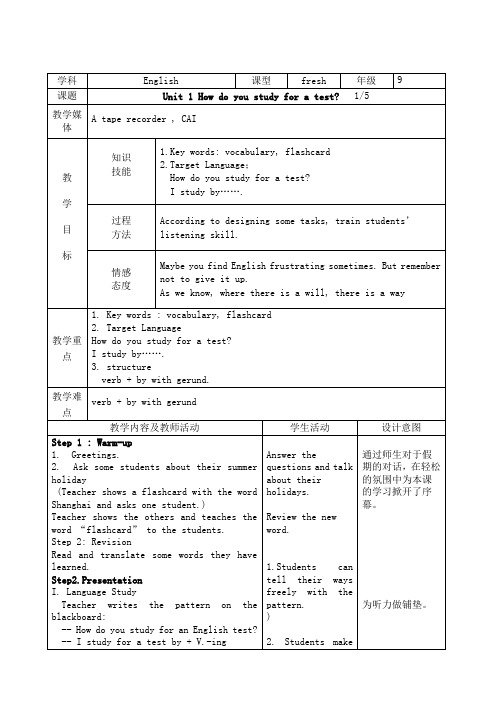
Unit 3 Teenagers should be allowed to choose their own clothes.Section AThe Third PeriodTarget language:A: What rules do you have at home?B: Well, I'm not allowed to go out on school nights. How about you?A: I'm not allowed to go out on school nights either. But I can study at a friend's house.This activity reviews the use of always,sometimes, usually and never.Point to the picture. Ask students to describe what is happening in the picture.Help students to say, The boy is late for class. Invite a student to read the four questions in the box to the class.Read the instructions and remind students of the exact meanings of the adverbs of frequency.Ask students to write A after things they always do, U after things they usually do, S after things they sometimes do and N for things they never do.II. 1bThis activity provides oral practice using the target language.Point out the sample conversation. Ask a pair of students to say it to the class.As the pairs work together, walk around the room offering help if necessary.Ask several pairs to share their conversations with the class.III.2aThis activity provides practice in Look at thepictures and saywhat is happeningin each picture.Students finishthe task on theirown in1aPair work.Talk with his/herpartner abouthis/her answers inActivity 1a.对看图作文能力进行培养。
人教新目标九年级英语全册教案Unit2教案
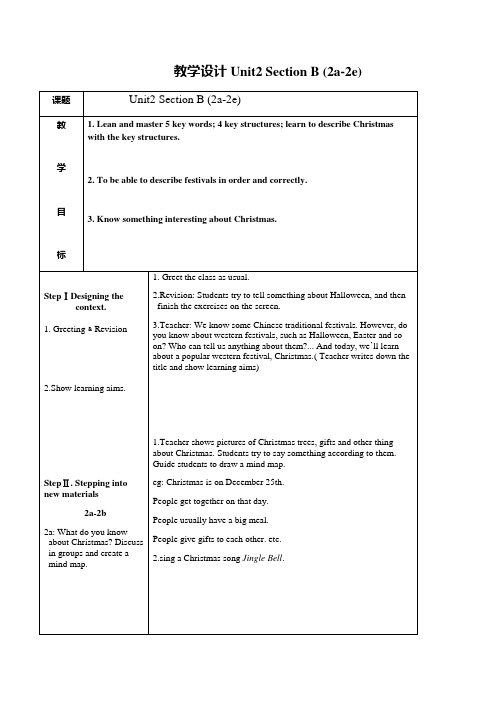
The girl never cares about others.
Marleyused tobe just like Scrooge.
used to意为“过去常常”,后接动词原形,表示过去的习惯,只表示过去和现在的对比,暗指现在已经不存在的动作或状态。
2.Phrases:
1. think about
2. care about
3. used to do sth.
4. warn sb. to do sth.
5. end up
6. remind sb. of sth.
7. decide to do
8. promise to do
9. treat sb. with sth
eg: Christmas is on December 25th.
People get together on that day.
Peopleusuallyhave a big meal.
People give gifts to each other. etc.
2.sing a Christmas songJingle Bell.
2. Does Scrooge have a lot of friends? Why or why not?
3. Why was JacobMarleypunished after he died?
4. Does Marley want to help Scrooge? How do you know?
A Christmas Carol is afamousshort novelwrittenbyCharles Dickens.
人教新目标九年级英语全册Unit9单元教学设计
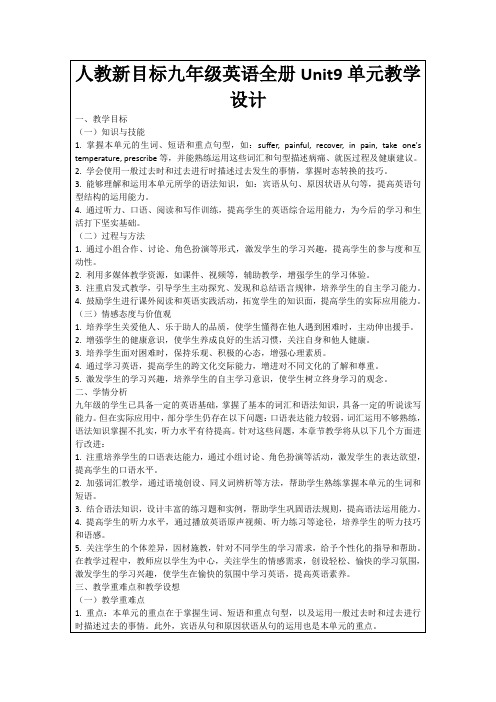
1.教学活动:学生分成小组,根据教师提供的话题进行讨论,分享各自的想法和经验。
2.教学目的:培养学生的口语表达能力,提高学生的合作能力。
3.教学步骤:
a.教师给出讨论话题,如:描述一次看病的经历、分享健康生活的小建议等。
b.学生分成小组,进行讨论,用英语表达自己的观点。
c.各小组选代表进行汇报,其他学生认真倾听,给予评价。
2.利用多媒体教学资源,如课件、视频等,辅助教学,增强学生的学习体验。
3.注重启发式教学,引导学生主动探究、发现和总结语言规律,培养学生的自主学习能力。
4.鼓励学生进行课外阅读和英语实践活动,拓宽学生的知识面,提高学生的实际应用能力。
(三)情感态度与价值观
1.培养学生关爱他人、乐于助人的品质,使学生懂得在他人遇到困难时,主动伸出援手。
c.教师对学生的练习进行批改,给予反馈,并进行针对性讲解。
d.学生根据教师的反馈,进行自我纠错,提高英语水平。
(五)总结归纳
1.教学活动:教师引导学生对本节课所学知识进行回顾和总结,巩固重点,梳理难点。
2.教学目的:帮助学生建立知识体系,提高学生的自主学习能力。
3.教学步骤:
a.教师引导学生回顾本节课所学词汇、短语、语法知识及句型。
2.互动教学:采用小组合作、讨论、角色扮演等形式,引导学生积极参与课堂活动,提高学生的口语表达能力,培养学生团队合作精神。
3.分层教学:针对不同学生的学习水平,设计不同难度的练习题和任务,使每个学生都能在原有基础上得到提高,激发学生的学习兴趣。
4.梯度训练:从基础知识的掌握到综合能力的提升,设计梯度训练,逐步提高学生的听说读写能力。
2.语法练习:完成课后练习册中与本节课相关的语法练习题,巩固宾语从句和原因状语从句的运用。
2022年九年级英语全册教案人教新目标版
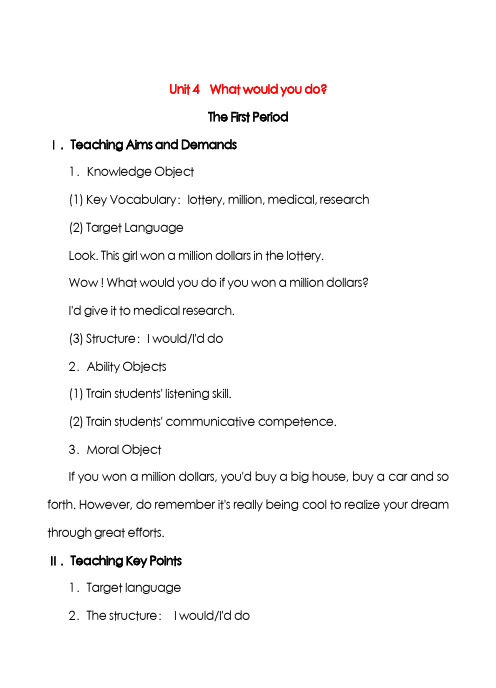
Point to the list of sentences. Invite a student to read them to the class.
Play the recording again. Students listen and check the things.
After students have had a chance to practice several exchanges, ask pairs to come to the front of the classroom and act out their conversations.
Step Ⅴ Summary
Check the answers:1,2,4,5
Step Ⅳ 2c
This activity provides oral practice using the target language.
Point to the list of Larry's worries in the box. Invite a student to read them to the class.
If you had a large amount of money, e. g. 100 , 000 what would you buy? Please write down each item and its cost to see when you will spend the full amount. And bring your lists to class tomorrow.
Look. This girl won a million dollars in the lottery.
人教版新目标九年级上册英语全册教案集
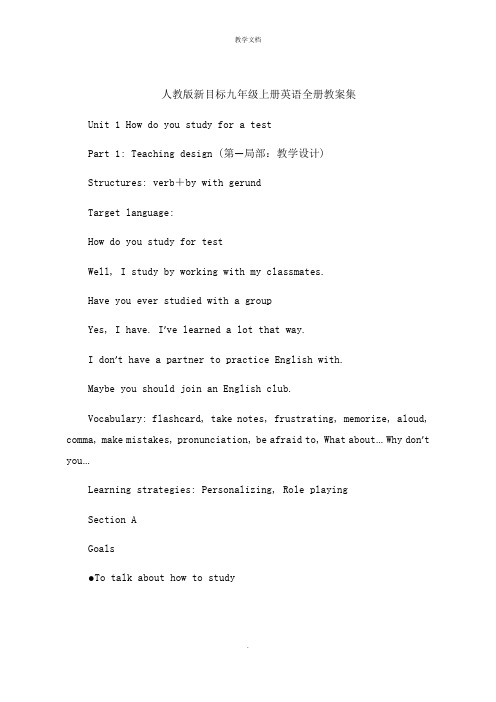
人教版新目标九年级上册英语全册教案集Unit 1 How do you study for a testPart 1: Teaching design (第—局部:教学设计)Structures: verb+by with gerundTarget language:How do you study for testWell, I study by working with my classmates.Have you ever studied with a groupYes, I have. I’ve learned a lot that way.I don’t have a partner to practice English with.Maybe you should join an English club.Vocabulary: flashcard, take notes, frustrating, memorize, aloud, comma, make mistakes, pronunciation, be afraid to, What about…Why don’t you…Learning strategies: Personalizing, Role playingSection AGoals●To talk about how to study●To read about how to studyProceduresWarming up by greetingHello, everyone!From now on you are a ninth grader. Congratulations to you and I wish you a great success in your studies!Today we shall take up the first unit in this new term, Unit 1 How do you study for a testLook at the blackboard and read after me the target language for this unit. When you read pay attention to the structure of the sentence.▲How do you study for test▲Well, I study by working with my classmates.▲Have you ever studied with a group▲Yes, I have. I’ve learned a lot that way.▲I don’t have a partner to practice English with.▲Maybe you should join an English club.Learning to Learn is very important. And learning to pass a test is also very important to you.Learning couldn’t be easier!If you have not developed good ways or methods to study for a test, talk to your classmates about it, your parents, or the teacher like me if you are brave enough. You should be brave enough to talk to others about your problems with your studies.Next I’d like to give you some useful practical advice about studying for a test and also ask you questions to make you think about things such as:▲using your time effectively▲motivation▲how to learn your lessons in the ninth grade year▲different modes of teaching you may meet▲how to develop particular skills, such as note-taking in class 1A: Checking the ways you studyNext turn to page 2 and check √ the ways you study for an English test. Then add other ways you use sometimes.▲How do you study for a testI study for a test___By reading to the tape; By underlining the expressions; By reading beyond the text; By doing used exam papers; By going over exercises books; By copying down the text; By learning the text by heart; By speakingwith classmatesNow raise your hand and report your added ways to the class. I will make a list of all the added ways on the blackboard.1b Listening and writingListen to understand how these people in the picture on page 2 study for a test. Write letters from the pictures. While listening, pay attention to the structures of the sentences.Section A 1b TapescriptBoy1: Hey, gang. There’s a big test on Tuesday. I really need some help. Can you tell me how you study for a big testVoices: Sure! Yes. Sure we will.Boy1: You did really well on the last English test, didn’t you, Mei Girl1: Yeah, I did OK.Boy1: Well, how did you study?Girl1: By making flashcards.Boy1: Maybe I’ll try that. How did you study, PierreBoy2: By asking the teacher for help. She was really happy I asked.Boy1: That’s interesting. How do you study, AntonioBoy3: I like to study by listening to cassettes. But sometimes mymother thinks I’m listening to music. And then she gets mad.Boy1:Oh, well…1c Doing a pairworkNow in pairs ask your partner how he or she studies for a test.A: How do you study for a testB: I study by working with a group.C: I study by listening to English.D. I study by playing games with my classmates.E. I study by doing actions such as coloring, matching.F. I study by singing English songs.G. I study by writingletters and emails.H. I study by acting out simple dialogues.I. I study by listening to and understanding stories.J. I study by writing simple sentences.K. I study by imitating from the recording.L. I study by speaking out words or phrases.M. I study by doing simple role plays.N. I study by reading and understanding simple stories.O. I study by using daily expressions.P. I study by performing short plays.Q. I study by performing simple rhymes.R. I study by writing sentences for pictures.S. I study by writing out simple poems.T. I study by reading aloud correctly.U. I study by playing text plays.V. I study by working with classmates.W. I study by going over the text before class.X. I study by copying words and expressions.Y. I study by looking and saying.Z. I study by asking others questions.2a Listening and checkingNow let’s go to page 3. Listen to the tape and check the questions you ask.While listening, pay attention to the structures of the sentences.Section A 2a, 2b TapescriptGirl1: Welcome to the English club. Today we’re going to talk about the best ways to learn English. Who has an ideaBoy1: Do you learn English by watching English-language videos Girl2: No. It’s too hard to understand the voices.Boy1: What about keeping a diary in English Do you learn English that wayGirl2: I think so. It helps to write English every day.Girl3: Have you ever studied with a groupGirl2: Yes, I have! I’ve learned a lot that way.Girl1: Do you ever practice conversations with a friendGirl2: Oh, yes. It improves my speaking skills.Boy1: What about reading aloud to practice pronunciationGirl3: I do that sometimes. I think it helps.Boy2: I do too. And I always look up new words in a dictionary.Girl3: That’s a great idea!2b Listening and matchingListen again and match each question from 2a with an answer in the box on page 3.2c Doing a pairworkNext we are going to make a conversation in pairs using the information from activities 2a and 2b.A: Have you ever studied with a groupB: Yes, I have. I’ve learned a lot that way.A: Have you ever learned English by watching videosB: Yes, I have. I’ve learned a lot that way.A: Have you ever practiced conversations with friendsB: Yes, I have. I’ve learned a lot that way.A: Have you ever listened to tapesB: Yes, I have. I’ve learned a lot that way.A: Have you ever read aloud to practice pronunciationB: Yes, I have. I’ve learned a lot that way.3a Reading the article and completing the chart1.Reading to the tapeWe are going to read the article on page 4. First we shall read to the tape together. That is, we start reading aloud as the recorder goes, and we stop reading aloud as the recorder stops. While reading, let’s pay enough attention to the pauses, the pronunciation and the intonation of the native reader. Make our reading aloud as the same as the reader’s.2.Reading and dividing the article into partsNext we are going to read aloud the article slowly and clearly. We will try to divide it into thought groups.3.Reading and underliningWe shall read the article once again, this time, to underline all the useful expressions in it. After school, you are going to write them down in your notebook.This week/ we asked students/ at New Star High School/ about the best ways/ to learn more English. Many said/ they learnt/ by using English. Some students had more specific suggestions. Lillian Li, for example, said/ the best way/ to learn new words/ was by reading English magazines. She said that/ memorizing the words of pop songs/ also helped/ a little. When we asked about studying grammar/ she said, “I never study grammar. It's too boring.〞Wei Ming feels differently. He's been learning English/ for six years/ and really loves it. He thinks/ studying grammar /is a great way/ to learn a language. He also thinks that/ watching English movies/ isn't a bad way/ because he can watch the actors/ say the words. Sometimes, however, he finds watching movies/ frustrating/ because the people speak too quickly.Lin Chang said that/ joiningthe English club/ at school/ was the best way/ to improve her English.Students get lots of practice/ and they also have fun. She added that/ having conversations/ with friends/ was not helpful/ at all. ;We get excited/ about something/ and then/ end up speaking/ in Chinese,〞 she said.4.Translating and completing the chartBecause you have read this article many times you are going to translate it into Chinese first and then complete the chart on page 4.Who will be the first to have a tryWays of learning EnglishNot successfulOKSuccessfulLillian LiStudying grammarmemorizing the words of pop songsreading English magazinesWei Mingwatching movieswatching English moviesstudying grammar Liu Changhaving conversations/ with friendsjoining the English club3b Doing a pairworkSilence, please! We are going to have a role play in pairs. One of the pair is to be one of the people in 3a. The other is to interview him or her about learning English.Zhao: Excuse me, Li Hong. Could you help me with my EnglishLi: Yes, please. What’s the matterZhao: I have difficulty studying grammar.Li: Grammar I never studying grammar. I study English mostly by memorizing the words of pop songs.Zhao: No grammar at allLi: Yes, I did study grammar. But I study it by reading English magazines. I put grammar learning into reading articles. That is the best way to understand English grammar.4 Doing a pairworkTurn to page 4 to check √what you do to learn English in the box.Closing down by asking and answering—How did you learn English *I listened to English them every day.*I read English books many times a day.*I learned many English songs by heart.*I sang the English songs to myself.*I learned every new English word in the text.*I learn English by going to English classes.*I do English homework at school.*I read English textbooks in the evening.*I speak English very slowly.*I play computer games in English.*I read a lot of English sentences in the morning.*I do well in class English tests.*I get a lot of good advice on learning English from my teacher. *I discuss English problems with my classmates.*I follow the advice from my father.*I learn English sounds from the tape.*I use English-English dictionaries.*I listen to recordings and English-language TV.*I talk to native speakers every chance I got.*I read books in English, mostly novels.*I learn a lot of new words from English books.*I write more and more e-mail in English.*I use English more than my first language.*Most of my reading (websites and books) is in English. Section BGoals●To listen about learning English●To talk about learning English●To read about learning EnglishProceduresWarming up by reading to the recordingHello, everyone. To begin with, let’s listen and read to the recording of the text HOW DO YOU LEARN BEST That is, read aloud to the tape, as fast as the tape goes, as clearly as the native reader reads. OK Here we go!My cat speaks English.Sometimes my cat comes to me and tells me that she is hungry. Or that her leg hurts. How does my cat tell me these things I don't speak pussy-cat language.1a Reading and checkingLearning English can be both easy and difficult. What things are easy for you And what things are difficult for you Now turn to page 5, read the list on the top and check √the statements that are true for you.1b Making a listYou have read and checked the statements true for you. Now thinkand make a list of other things difficult for you, too.I don’t know how to…!1. I don’t know how to use commas.2. I don’t know how to work with others.3. I don’t know how to make flashcards.4. I don’t know how to read the textbook.5. I don’t know how to make vocabulary lists.6. I don’t know how to listen to tape.7. I don’t know how to ask the teacher for help.8. I don’t know how to study for a test.9. I don’t know how to work with a group.10. I don’t know how to watch English videos.11. I don’t know how to practiceconversations with friends.12. I don’t know how to read aloud to practice pronunciation.13. I don’t know how to learn by using English.14. I don’t know how to get more specific suggestions.15. I don’t know how to read English magazines.16. I don’t know how to learn new words.17. I don’t know how to memorize the words.18. I don’t know how to studying grammar19. I don’t know how to watching English movies20. I don’t know how to joining the English club21. I don’t know how to improve her English22. I don’t know how to get lots of practice13. I don’t know how to ask teachers about the best ways to learn more English.2a Listening and checkingPaul is a nice boy. He works hard at his English, but still has many learning challenges. Now listen to find out what challenges he has and check them in the box on page 5.Challenges to Paul at learning English1._____ can’t get the pronunciation right.2._____ forget a lot of new words.3._____ can’t understand when people talk to me.4._____ can’t understand the words in magazines.5._____ don’t get much writing practices.2b Listening and matchingNow listen again to Paul talking about his challenges at learning English and match them with the solutions listed in the box on page 5. While listening, pay attention to the structures of the sentences.TapescriptTeacher: You look worried, Paul.Boy: I am, Ms Mitchell. I’m having trouble learning English.Teacher: You said you liked English. What’s the problemBoy: I can’t get the pronunciation right.Teacher: Well, listening can help. Why don’t you borrow the teacher’s tapes You can listen to them at home and repeat the sentences that are difficult for you.Boy: That’s a good idea. But what about all the new words I forget a lot of new words.Teacher: You can always write the new words in your notebook and study them at home. You can even study in the train on the way to school.Boy: That might really help! Thanks.Teacher: Can you understand when people talk to youBoy: Well, no. Not always. Sometimes I just don’t understand what people are saying.Teacher: Why don’t you join an English language club to practicespeaking English The English club meets after school on Tuesdays and Thursdays.Boy: Maybe I’ll go. The only other problem I have is that I don’t get much writing practice.Teacher: Maybe you should find a pen pal.Boy: That sounds like a fun way to practice writing. Thanks, Ms Mitchell.2c Doing pairworkIN pairs we are going to role play conversations using the information from activities 2a and 2b.I don’t have a partner to practice English with.Maybe you should join an English language club.I can’t get the pronunciation right.Listening can help.I forget a lot of new words.Write the new words on cards and study them daily.I can’t understand when people talk to me.You can join an English club to talk to people more in English.I can’t understand the words in magazines.You can look them up ina dictionary.I don’t get much writing practices.Start writing an English diaryevery day.I read very slowly.You should read to the recording of the text.I make mistakes in grammar.Why don’t study the basic sentence patterns3a Reading and cuttingIt’s time to read the text HOW I LEARN ENGLISH. Now read and check (/) the sentences.We are going to read the text again to study the form and function of all the predicate verbs.How I learned to learn EnglishLast year/ my English class/ was difficult/ for me. First of all, it wasn't easy/ for me/ to understand the teacher/ when she talked to the class. To begin with, she spoke/ too quickly, and I couldn't understand every word. Later on, I realized that/ it doesn't matter/ if you don’t understand /every word. Also/ I was afraid to speak/ in class, because/ I thought/ my classmates/ might laugh at me. I couldn't always make complete sentences, either. Then/ I started to watch English-language TV. It helped/ a lot. I think that/ doing lots of listening practice/ is of the secrets of becoming a good language learner. Anotherthing/ that I found/ very difficult/ was English grammar. So/ I decided to take lots of grammar notes/ in every class. Then/ I startedto write my own original sentences/ using the grammar/(that) I was learning. It’s amazing/ how much/ this helped. Now/ I am enjoying learning English/ and I got an A/ this term. My teacher is very impressed.Next we shall read the text for the third time to underline all the useful expressions. After class you are to copy them into your notebook.All right, read the text the fourth time and circle all the signal words, or the linking words which connect all the short sentences.Now you may read the statements in the box on page 6 following the text. Write “T〞 or “F〞 beside each statement.3b Writing a letterYour friend Lin Feng is having difficulties with her English. Write her a letter telling her how to become a better English learner.Dear Lin Feng,I know it isn’t easy to learn English, but I have some ideas that may help. You said you couldn’t understand people who talked fast. Well, you can try to listen for the most important words, not every word. It is difficult to understand by listening what you have not read or what you can’t understand well by reading. To listen well you have to read well. So keep on reading English. Listening and reading to the recording of the text is very important, too. Every text, after being read, should be listened to and read aloud to the tape. At first you may find itdifficult to follow the reader reading aloud the text. Don’t worry. If you keep practicing you will be able to read aloud as fast as the native reader from the tape. And then you can understand people who talk fast in English.Yours,Tai Zuo3c Writing an articleYou have been learning English for at least three years. That is such a long time. Now think about the things that have helped you the most in learning English. Write an article telling others about them.4 Doing an interviewNext we shall do an interview in groups of four. Ask the three group mates about learning English. Take notes of what they say. Tomorrow you shall stand to tell the class about their answers.Q. What isn’t easy about learning EnglishA. Reading is not easy.Q. What do you do about thisA. I try to cut the sentences into thought groups.Q. What is your favorite way to learn more EnglishI read and read aloud a lot. These are the best way.Closing down by singTo end this period let’s sing an English song.Rain, rain, go away,Come again another day,Little JohnnyWants to play.Rain, rain, go to Spain,Never show your face again.SELF CHECK1.Filling in the blankWe shall make a check on our use of expressions first. Turn to page 7 and fill in each blank with the correct word given. Change the form of the word if necessary. Then make your own sentences with each word.Complete the sentencesMake your sentences1. You should write down new English words in a vocabulary list.Don’t trust your memory. Write it down.2. If you don’t know how to spell new words, look them up in a dictionary.I don’t know how to spell your name.3. The best way to improve your English is to join an English club. I’d like to join the school football tea.4. Another thing that he find very difficult was English grammar.I find it easy to learn English.5. This kind of paper feels very soft.Do you feel cold2.Writing an articleTurn to page 7 and write an article about Xu Zheng using the notes on Xu and his essay.Xu Zheng: a boy fond of EnglishMost people in the world speak English as a second language. And so does Xu Zheng.Yesterday I asked Xu Zheng about his ways to learn English. He said he learns by making up conversations and speaking to friends in English. When I asked about studying pronunciation, he said he spent much time on it, but he still found native speakers’ pronunciation difficult to learn.I said to him, “You are a computer student. Why are you so interested in English〞“English popular in science. And it is popular around the world for computers,〞 he told me. “I likewriting notes, watching movies and listening to pop songs. But I like reading in English online most, 〞 added he.Xu Zheng is right. English can really help us understand many newthings from other countries. Let’s learn from Xu Zheng. Let’s be fond of English, too.IReading: How do we deal with our problemsAs English is learned mostly through reading in China, we shall now turn to page 8 to learn to read the article entitled: How do we deal with our problemBefore reading, please go over the vocabulary list for reading on page 146. Get yourself familiarized with all the words and expressions to be found in the article.While reading try to divide the sentences into thought groups and underline all the expressions useful to you. While you are reading it for the second time, try to circle all the linking words and try translating the text into Chinese.How do we deal with our problemRich or poor, young or old, we all have problems. And unless we deal with our problems, we easily become unhappy. Worrying about our problems can affect how we do at school. It can also influence the way we behave with our families. So how do we deal with our problems There are many ways.By learning to forgetMost of us have probably been angry with our friends, parents or teachers. Perhaps they said something you didn't like, or you feltunfair. Sometimes, people can stay angry for years about a small problem. Time goes by, and good friendships may be lost.When we are angry, however, we are usually the ones affected. Perhaps we have seen young children playing together. Sometimes they have disagreements, and decide not to talk to each other. However, this usually does not last for long. This is an important lesson for us: we can solve a problem by learning to forget.By regarding problems as challengesMany students often complain about school. They might feel they have too much work to do sometimes, or think the rules are too strict. We must learn how to change these ;problems; into ;challenges;. Education is an important part of our development. As young adults, it is our duty to try our best to deal with each challenge in our education with the help of our teachers.By thinking of something worseBy comparing yourself to other people, you will find your problems are not so terrible. Think about Stephen Hawking, for example, a very clever scientist, who regards his many physical problems as unimportant. He can't walk or even speak, but he has become very famous and successful. We are probably quite healthy and smart. Let's not worry about problems. Let's face the challenges instead.After reading, copy the underlined expressions into your PhraseBook as home.Expressions from How do we deal with our problemrich or poor, young or old, have problems, deal with one’s problems, become unhappy, worry about one’s problems, do well at school, influence the way, behave well with…, deal with one’s problems, be angry with…, feel unfair, stay angry for years about…, time goes by, lose good friendships, see… playing together, have disagreements, talk to each other, last for long, an important lesson for…, solve a problem by learning to forget, regarding problems as challenges, complain about school, have too much work to do, the rules are too strict, change…into…, an important part of one’]s development, as young adults, be one’s duty, to try one’s best, to deal with…in one’s education, with the help of…, thinking of something worse, comparing…to…, find one’s problems, think about…, for example, a very clever scientist, regards…as unimportant, become very famous and successful, worry about…, face the challenges Part 2: Teaching Resources (第二局部:教学资源)Tips for BeginnersYou are like a new babyBabies learn their language slowly.First they learn to listen.Then they learn to talk.Finally, they can read and write. Listen to English every dayListen to English radio.Watch English TV.Go to English movies.Use online lessons.Make an English/ESL friendMake up conversations.Practice dialogues.Usebeginner textbooks.Read English storiesStart with children's storybooks.Try ESL readers.Read advertisements, signs and labels. Try EnglishClub for Young Learners. Write down new wordsStart a vocabulary (new word) notebook.Write words in alphabetical order (A...B...C...). Make example sentences.Always use an English-English dictionary first. Keep an English diaryStart with one sentence.How do you feelHow is the weatherWhat did you do todayWrite another sentence tomorrow.Visit an English speaking countryLearn English more quickly.Stay with an English family.Hear native speakers talk.Have a fun experience.Unit 2 I used to be afraid of the dark.Part 1: Teaching design (第—局部:教学设计) Structures: used toTarget language:Mario used to be short.Yes, he did. Now he’s tall.I used to eat candy all the time.Did youYes, I did. And I used to chew gum a lot.Vocabulary: used to, dark, spider, insectLearning strategies: Brainstorming ComparingSection AGoals●To learn about the use of used to●To talk about what you used to be likeProceduresWarming up by learning “used to 〞Hi, everyone. Today we’re going to study Unit 2. Its title is I used to be afraid of the dark. In the title we find a phrase“used to 〞. What does it mean How is it used in Englishused to的用法“used to加不定式〞表示过去常常干某事,现在不在干了。
英语教案人教版新目标九年级英语全册 Unit 7
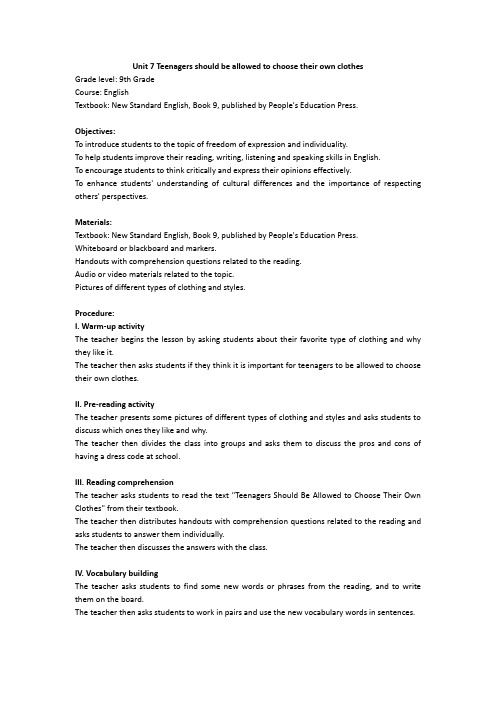
Unit 7 Teenagers should be allowed to choose their own clothesGrade level: 9th GradeCourse: EnglishTextbook: New Standard English, Book 9, published by People's Education Press.Objectives:To introduce students to the topic of freedom of expression and individuality.To help students improve their reading, writing, listening and speaking skills in English.To encourage students to think critically and express their opinions effectively.To enhance students' understanding of cultural differences and the importance of respecting others' perspectives.Materials:Textbook: New Standard English, Book 9, published by People's Education Press.Whiteboard or blackboard and markers.Handouts with comprehension questions related to the reading.Audio or video materials related to the topic.Pictures of different types of clothing and styles.Procedure:I. Warm-up activityThe teacher begins the lesson by asking students about their favorite type of clothing and why they like it.The teacher then asks students if they think it is important for teenagers to be allowed to choose their own clothes.II. Pre-reading activityThe teacher presents some pictures of different types of clothing and styles and asks students to discuss which ones they like and why.The teacher then divides the class into groups and asks them to discuss the pros and cons of having a dress code at school.III. Reading comprehensionThe teacher asks students to read the text "Teenagers Should Be Allowed to Choose Their Own Clothes" from their textbook.The teacher then distributes handouts with comprehension questions related to the reading and asks students to answer them individually.The teacher then discusses the answers with the class.IV. Vocabulary buildingThe teacher asks students to find some new words or phrases from the reading, and to write them on the board.The teacher then asks students to work in pairs and use the new vocabulary words in sentences.V. Listening comprehensionThe teacher plays an audio or video clip related to the topic, and asks students to listen carefully. The teacher then distributes handouts with comprehension questions related to the clip and asks students to answer them.VI. Writing activityThe teacher asks students to write a persuasive essay about why teenagers should be allowed to choose their own clothes.The teacher then asks students to exchange their writing with a partner, and to provide feedback on each other's writing.VII. Follow-up activityThe teacher concludes the lesson by asking students to share their opinions about the importance of freedom of expression and individuality, and how they think this applies to clothing choices.Assessment:The teacher can assess students' performance through the following:Observing their participation in class discussions and group activities.Reviewing their answers to comprehension questions.Assessing their writing activity and providing feedback.Observing their use of new vocabulary words in sentences.Homework assignment for "Teenagers Should Be Allowed to Choose Their Own Clothes" lesson:Write a persuasive essay arguing for or against having a dress code at school.Find a news article or opinion piece about a recent controversy related to clothing and dress codes, and write a summary of the article and your own opinion on the issue.Interview a family member or friend from a different culture about their attitudes towards clothing and fashion, and write a reflection on what you learned.Choose a celebrity or fashion icon and research their style and fashion choices. Write a short biography of the person and discuss their impact on fashion trends.Watch a documentary or video about the history of fashion and write a summary of what you learned.Write a journal entry reflecting on your own personal style and how it reflects your individuality.Practice reading aloud the text "Teenagers Should Be Allowed to Choose Their Own Clothes" from your textbook, paying attention to your pronunciation and intonation.。
人教版新目标九年级英语全英文说课稿

人教版新目标九年级英语全英文说课稿第一篇:人教版新目标九年级英语全英文说课稿找教案Unit13Rainy days make sad.SectionA(1a-1c)Hello, everyone,Today I’m very pleased to have an opportunity to talk about some of my teaching ideas.My topic is Section A(1a-1c , Grammar Focus)in Unit13.It is made up of seven parts.1.Analysis textbook(教材分析)2.The teaching methods(教学方法)3.The learning methods(说学法)4.Analysis the students(说学情)5.The procedures of the teaching(教学步骤)6.Blackboard design(板书设计)7.Self evaluation.(自评)Part 1The analysis of the teaching material:This lesson is about listening and speaking.It plays a very important part in the English teaching of this unit.By studying Section A , The students can improve their speaking ability, learn more about things that affect people.At the same time, we should get the students to understand better.The students should do some listening, speaking and writing, too.Of course, the students should receive some moral education.Let the students have positive attitude to dealing with things around them.1.Teaching objectsThe teaching aims are established according to Junior School English curriculum standard nguage goals1).Words & expressions :tense, some adjectives of feeling2).Key sentencesLoud music makes me tense.(P103)Loud music makes me want to dance.That movie made me sad.B.Ability goalsEnable the students to talk about how things affect them.Emotion & attitude goalsEnable the students to understand the effect of things upon them.The teaching key and difficult points are established according to Section A ,Unit13 in the teaching material’s position and function.2.Teaching Key Pointsthe usage of make.3.Teaching DifficultiesTrain the Ss to use make correctly.T o improve students’ listening ability.To train students' communicative competence.:Part 2.The teachingmethodsTask-based teaching;Cooperative learning;Part 3.The learning methods1).Set up six steps.It is presentation–words –pairwork –listening practice–Grammar-practice2).Ask the students to take part in class actively and develop their cooperation in the activities.Part 4.Analysis the students The students have learned some words about feeling and they have k now the word make.But they don’t often use English to express themselves and communicate with others.Some Ss are not active in the class because they are afraid of making mistakes.Part 5.The procedures of the teachingI have designed the following steps to train their ability of listening, speaking, reading and writing, writing , especially listening and speaking.Set up six steps.It is greeting –lead-in-presentation– words – pairwork – listening practice–Grammar –practice –homework.Step Ⅰ Lead-in.Show the Ss a picture and then show the teaching material.Purpose: Arouse the students’ interest of study.Bring in new subject: Rainy days make mesad.Step IIPresentation.Review some words about feeling , then present the sentence structure.A:What makes him/her B:makes him sad.Purpose :Through this part we can consolidate what they studied yesterday, communicate with others about their feelings and prepare for the new lesson.Step IIIListening(1a, 1b: P102) Ask the students to listen to Amy and Tina talking about the two restaurants and do the exercises.Purpose :Train the Ss’ listening ability and prepare for later exercises.Step IVSpeaking(1c: P102)Ask the students to talk about how music affects them.Let the Ss work in pairs andtalk about how the two restaurants would affect them.Purpose :Train the Ss’ speaking ability and prepare for later exercises.Step VDo a survey.After learning 1b , 1c , let the Ss do a survey about other things that affect them.Purpose : This step can open the Ss eyesight and thought.It’s a s tep from textbook to real life.Step VIGrammar1).Sum the usage of make then help them to say out the sentence structure.2).Do some exercises to consolidate the grammar.Purpose: Train the Ss’ ability of understanding and using language.Step VIIWriting practice1.List 4-5 things around you and then describe how the things affect you.positionExams make me _______。
英语教案人教版新目标九年级英语全册 Unit 9

Unit 9 I like music that I can dance to教学目标:能够听懂并口头表达关于音乐类型的信息。
能够用英语描述音乐、乐器、音乐家等。
能够通过听、说、读、写的综合训练提高英语综合运用能力。
教学重点:了解不同音乐类型的特点。
能够用英语描述音乐类型。
学会用定语从句描述自己喜欢的音乐。
教学难点:运用定语从句描述自己喜欢的音乐。
听力训练的提高。
教学准备:多媒体课件。
Unit 9的教材及练习题。
Step 1: Warm-upThe teacher plays a piece of music and encourages students to guess the genre of the music based on the melody and lyrics.The teacher randomly asks students about their knowledge of music.Step 2: PresentationThe teacher introduces different genres of music and plays music of different genres to help students understand the characteristics of each genre.The teacher guides students to discuss the differences between different types of music and to describe the characteristics of different genres of music in English.Step 3: PracticeThe teacher designs a listening exercise where a piece of music is played and students choose suitable adjectives to describe the song.The teacher designs an exercise where students describe their favorite type of music and use relative clauses to describe the genre of music they like.Students work in pairs to discuss their favorite music and share their descriptions using relative clauses.Step 4: Productionteacher asks students to work in small groups and create a playlist of songs for a specific event or occasion, such as a party, a wedding, or a workout session. Each group presents their playlist and explains the reason for choosing the songs.The teacher encourages students to share their opinions about different types of music and engage in a class discussion about the role of music in people's lives.Step 5: Review and AssessmentThe teacher reviews the vocabulary and grammar structures covered in the lesson and provides additional practice exercises to reinforce the learning.The teacher assesses students' understanding of the lesson through a quiz, a writing assignment, or a role-playing activity.The teacher provides feedback and guidance to help students improve their language skills and achieve their learning goals.For homework, students can:Write a paragraph about their favorite type of music and use relative clauses to describe the genre of music they like.Create a playlist of songs for a specific event or occasion and write a short explanation for why each song was chosen.Research a famous musician or band and write a short biography about them, including information about their music and achievements.Listen to a song in a foreign language and write a brief summary of the lyrics, including any new vocabulary or expressions they learned.Watch a movie or TV show that features music as a major theme or plot element, and write a review of the film, focusing on how the music enhances the story or characters.。
- 1、下载文档前请自行甄别文档内容的完整性,平台不提供额外的编辑、内容补充、找答案等附加服务。
- 2、"仅部分预览"的文档,不可在线预览部分如存在完整性等问题,可反馈申请退款(可完整预览的文档不适用该条件!)。
- 3、如文档侵犯您的权益,请联系客服反馈,我们会尽快为您处理(人工客服工作时间:9:00-18:30)。
【教学目标】
1.学生能掌握重点词汇以及目标语言。
2.了解西方国家Halloween的相关知识并熟练运用目标语言谈论节日。
3.在听的过程中体验感知目标语言等内容,并学会提取所需要的关键信息。
【教学重难点】
重点:1.重点词汇:haunted,ghost,trick,treat,spider
三、布置作业
1.SaysomethingaboutHalloween.
2.WriteashortpassageaboutHalloween.
┃教学小结┃
【板书设计】
Unit2Ithinkthatmooncakesaredelicious!
SectionB(1a-1d)
1.It’sascaryfestival.
Step4:Workon1d
1.AskstudentstotalkabouttheHalloweenactivitiesthatinterestthemmostingroups.
2.Askseveralgroupstoactout.
设计意图:设置小组活动目的是对学生进行小组间、成员间合作意识的培养。学生间用学过的目标语言进行合作交流完成小组任务,使得所有的学生都能参与到课堂教学实践中,提升语言运用能力。
2.目标语言:(1)Manypeoplmaketheirhouseslookscary.
(2)Littlekidsandevenparentsdressupasghostsorblackcats.
(3)“Trickortreat”meanskidswillplayatrickonyouifyoudon’tgivethematreat.
2.Manypeoplemaketheirhorseslookscary.
3.Theymayturnoffthelightsandlightcandles.
4.Theycanalsodressupasfunthings...
5.Peopletaketheirchildrenaroundtheneighborhood...
6.“Trickortreat!”
设计意图:通过让学生回忆Halloween节日活动,调动学生的兴趣及对Halloween的好奇心,能够积极参与后续的课堂教学活动。
二、展开过程,探究新知
Step2:Presentation
1.Teachsomenewwords.
scary;dressup;hauntedhouse;candy;ghost;trickortreat;October;spider;blackcat
难点:在掌握宾语从句句型的基础上,进一步通过听力,检查学习中存在的问题。
【课前准备】
1.根据课本提到的节日搜集相关图片及视频。
2.准备好录音机、制作多媒体课件及学案。
┃教学过程设计┃
一、创设情境,切入主题
Step1:Lead-in
AskstudentstoreviewsomewordsusedtodescribeactivitiesinHalloween,andwritethemontheblackboard.
2.Askstudentstoreadanduse.
3.Askstudentstofinish1a.
设计意图:让学生对节日的相关内容进行温习巩固,也为学习与之相关的内容作好铺垫。
Step3:Listeningto1b&1c
Listentotherecordandworkon1band1c.
设计意图:加强学生听力指导,在听时要抓重点内容。第一次听要求学生回答问题,因此在听的时候,应重点听与这些问题相关的内容,其他作为非重点内容。另外,注意要速记重点内容。
